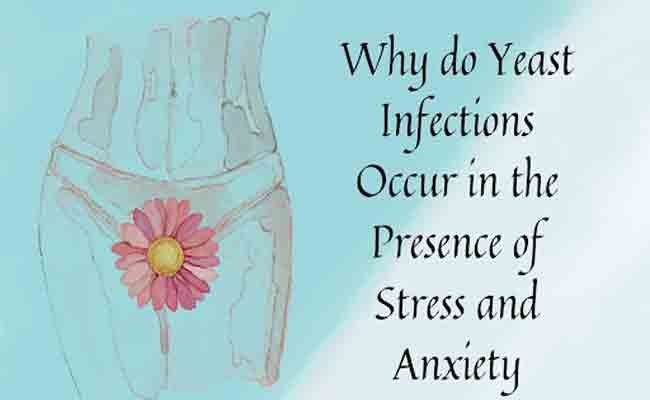
Non-Traditional Ways To Stay Warm This Winter
September 27, 2022
7 Unique Custom T-shirt Printing Ideas For Men
October 3, 2022Hello friends how are you all? Today we are going to talk about Why Do Yeast Infections Occur In The Presence Of Stress And Anxiety? Stress is any change in the environment that causes your body to react and adjust. Different responses are elicited by the body due to these changes. Stress has been known to contribute to a myriad of illnesses. As such, all activities that cause stress and anxiety should be properly managed. This article intends to analyze how stress contributes to yeast infection.
Before we proceed, let’s understand what yeast infection is. Yeast grows naturally on your skin, as well as in your intestines, mouth, and vagina. However, depending on your lifestyle and immune system, this yeast can sprout to dangerous levels. Yeast infections in the vagina are a typical condition caused by excessive yeast growth in your body.
Why Do Yeast Infections Occur In The Presence Of Stress And Anxiety?
If your vaginal chemistry is disrupted, the normal yeast that lives in your vagina can overgrow and cause an infection. It frequently causes itching and other unpleasant symptoms. Vaginal yeast infection is mainly accompanied by redness, soreness, and burning sensation.
However, symptoms of a vaginal yeast infection can be relieved within a few days of treatment. It may take longer in more severe cases. There are vaginal yeast infection treatments that help in reducing itchiness.
With over the counter yeast infection treatments, you can get a soothing cream for yeast infection. These creams will help with the burns, soreness, and itchiness and you will be relieved in no time. Always make sure you get yours over-the-counter yeast infection treatments from credible manufacturers and vendors.
Does Stress Cause Yeast Infections?
There is no scientific proof that stress directly causes vaginal yeast infections. Stress, on the other hand, can alter how your body responds to infections. It typically makes infections more difficult to treat.
How Stress Increases Vaginal Yeast Infections
Yeast, like bacteria, is naturally found in the vagina and surrounding skin. Infections, on the other hand, arise only when the bacteria-to-yeast ratio is thrown off. Poor vaginal hygiene, hormonal birth control, and antibiotics can all disrupt this equilibrium.
There is no proof that stress causes the yeast to expand beyond its limits and cause an infection. There is no evidence that stress increases your susceptibility to infections.
Stress can weaken the immune system and allow yeast that provokes the infection to thrive uncontrollably. However, one of the aforementioned factors must first cause yeast infection. Stress may only be a factor in making the infection more resistant.
Other Triggers of Yeast Infection
- Inconsistent hygiene. Poor hygiene practices, such as failing to shower or clean the vaginal area regularly, can contribute to recurring yeast infections. However, avoid using vaginal washes and scented soaps to clean your vagina. These chemicals can change the pH of your vaginal fluid. When your vaginal pH is out of balance, certain bacteria can overgrow. This may result in vaginal yeast infections.
- Unprotected sex and sex with random persons. Sexual activity doesn’t cause yeast infections directly, and yeast infections are not considered STIs by doctors. Some sexual practices, such as finger insertion, can, however, introduce bacteria into the vagina. The new bacteria may stimulate the growth of the Candida fungus, resulting in a yeast infection. It is also possible to get a yeast infection after having oral sex. Bacteria are also introduced through a person’s mouth and saliva. It is advised to avoid sex when infected. This is because partners can transfer the infection back and forth. Condoms and dental dams can assist in stopping the spread among partners, but they are not always effective.
- Antibiotics. Vaginal yeast infections are frequently caused by antibiotics. On taking antibiotics, the “good” bacteria in your vagina that help keep yeast at bay may be harmed as well. Frequent antibiotic use can promote yeast growth, resulting in recurring yeast infections.
- Pregnancy. The hormonal changes that occur during pregnancy can destabilize the normal balance of estrogen and progesterone. This affects the growth of candida yeast. Sugar levels in vaginal secretions are also higher in pregnant women. This can also promote candida growth.
Vaginal Yeast Infection Treatment and Tips to De-stress
First, see if you’re suffering from a yeast infection. If you are infected, you can get an approved anti-itch cream for yeast infections. If you are unsure, consult a medical practitioner for testing and treatment options. You can treat vaginal yeast infections with an over-the-counter cream. Or it can be treated with a prescription anti-yeast pill.
On the other hand, stress can also be a culprit in increasing the growth of yeast infection. Since stress can affect the body and subsequently weaken your immune system, take steps to relax. If possible, avoid activities and events that will result in mental and emotional stress. Here are some ways you can de-stress
- Working out more frequently
- Using a meditation app
- Reducing your work or life responsibilities
- Getting enough sleep
- Seeking therapy
- Practice meditation for stress and anxiety
It is also suggested that you eliminate sugar from your diet.
Methods for Preventing Yeast Infections
Although yeast infection treatment is important, preventing it is best. It has been established that reducing stress does not guarantee that a yeast infection will not occur. However, keep these other suggestions in mind to help you avoid them.
Take a Probiotic Supplement
The gut isn’t the only body part where beneficial bacteria can be found. The vagina, like the gut, has its microbiome. Yeast infections can occur when the beneficial bacteria in the vagina are disrupted. According to some studies, probiotics can replenish these protective bacteria and aid in the fight against yeast infections.
Taking a high-quality probiotic is one method for maintaining gut health and thus vaginal health. There are also vaginal probiotics, which are specifically designed to balance the vaginal microbiome. If you’re unsure which type is best for you, talk to your doctor or a gynecologist.
Limit Your Intake of Processed Foods and Sugars
There is some proof that sugar may aid in yeast growth. Some experts believe that diet may be a risk factor for some women developing yeast infections. Reducing processed foods and sugars, which can feed yeast in the gut, may be part of the solution. Vaginal health is inextricably linked to gut health. So if the gut is off, it frequently throws off the vagina.
A well-balanced diet and a lot of water can also aid in the prevention of yeast infections. It is preferable to eat foods like green vegetables, protein nuts, and herbal tea instead of excess sugar consumption.
Put on Cotton Underwear
Tight jeans, thongs, and non-cotton underwear do not make airflow around your vagina. Yeast thrives in moist, dark conditions. Furthermore, the increased moisture caused by these clothes creates an ideal environment for yeast to grow. Cotton underwear is more porous than other materials. This allows air to circulate and prevents moisture buildup.
If you suffer from recurring yeast infections, wear cotton underwear. Substitute between jeans and clothes that allow for better airflow. Furthermore, change out of wet clothes after working out. Don’t wear a wet or damp bathing suit for long after swimming.
Don’t Douche
An excellent means of avoiding yeast infections is to avoid using soap or feminine washes in the vagina. There is no point in using anything to assist the vagina in cleaning itself. To avoid any unwanted reactions that could lead to an infection, use an unscented, mild soap or wash.
Get Adequate Sleep
A weakened immune system can result from tossing and turning all night or not having a full eight hours of sleep. A good night’s sleep allows your body to repair itself and stay healthy.
A weakened immune system can cause an increase in naturally occurring vaginal acidity. This, in turn, lowers the pH of your vagina, creating an environment conducive to the growth of vaginal yeast. When the pH of the vaginal fluid drops, some women are unable to fight yeast naturally. As a result, they develop a yeast infection.
Bottom Line
Stress may not always be the source of yeast infections. The infection, however, may last longer based on how the body responds to the stress. Since stress can contribute to yeast growth, it’s best to avoid strenuous activities. Also, avoid excessive sugar and processed foods. Focus on natural fruits and vegetables.
Furthermore, your hygiene should be put into consideration. Wear clean and cotton underwear for better airflow in your vagina. Limiting these external triggers can aid in the management of yeast infections. In case of complications, seek medical attention if your yeast infections persist.




